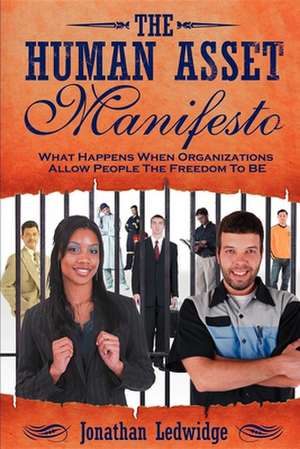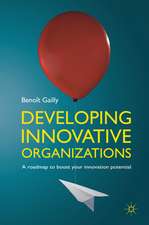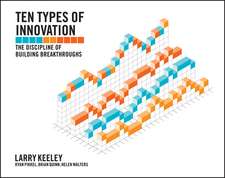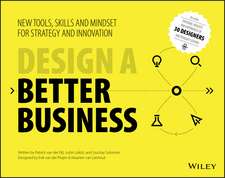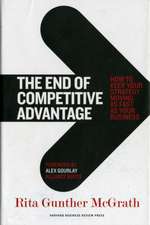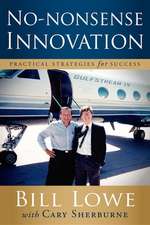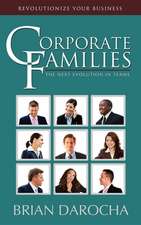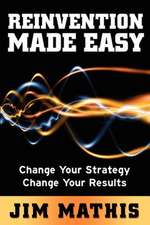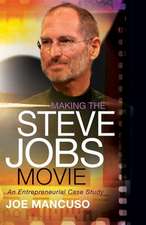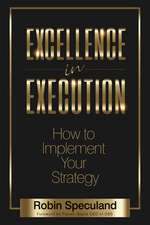Human Asset Manifesto: What Happens When Organizations Allow People the Freedom to Be
Autor Jonathan Ledwidgeen Limba Engleză Paperback – 31 mar 2007
Preț: 118.55 lei
Nou
Puncte Express: 178
Preț estimativ în valută:
22.69€ • 24.64$ • 19.06£
22.69€ • 24.64$ • 19.06£
Carte disponibilă
Livrare economică 01-15 aprilie
Preluare comenzi: 021 569.72.76
Specificații
ISBN-13: 9781600370427
ISBN-10: 160037042X
Pagini: 348
Dimensiuni: 157 x 228 x 22 mm
Greutate: 0.53 kg
Editura: Morgan James Publishing
ISBN-10: 160037042X
Pagini: 348
Dimensiuni: 157 x 228 x 22 mm
Greutate: 0.53 kg
Editura: Morgan James Publishing
Notă biografică
Jonathan Ledwidge was born in London but grew up in his parent's native Jamaica. He studied Physics and Chemistry at the University of West Indies before joining Price Waterhouse, later qualifying as a Chartered Accountant. He worked for J Wray & Nephew, a manufacturer and distributor of sugar and rum, before migrating to the UK in 1986. For the next eighteen years, he worked in the City of London for a number of global investment banks, including Continental, CIBC Capital Markets, and ABN AMRO. Much of this time was spent on developing and implementing business strategies for the global capital markets in a range of sophisticated products and services. Towards the end of his investment banking career, Jonathan focused on learning, knowledge development and cultural change, and devised strategies and approaches for improving output and productivity for product origination and distribution teams in the global financial markets. Jonathan has combined his extensive knowledge and experience in business, with a lifelong passion for history, politics, and culture. He has read and traveled extensively in pursuit of these interests. It was his recognition of the wider human and social issues within businesses that ultimately led him to research and write The Human Asset Manifesto, develop THAEvaluator, and launch THAPartners, where he is now the Managing Partner. Jonathan holds an MBA from Cass Business School in London. His first book, A Mannequin for President, is a critique on US Presidential politics. He describes his overall socio-political philosophy as Equal Lives - the idea that every single human life on this planet is as valuable as any other. Jonathan has an enduring interest in history, politics, and culture. He reads extensively on these topics and indeed his first book, A Mannequin For President, was a critique of US Presidential politics. He maintains his interest in political issues by writing a column on his personal website, www.jonled.com, every two weeks, and takes every available opportunity to speak on or debate any topic. He is of the opinion that without an understanding of history it is quite difficult or almost impossible to assess or interpret current events. He maintains that the world we inhabit was not created by yesterday's news, and is quite astonished at the extent to which modern day journalists routinely ignore this principle. Thus he ensures it is suitably reflected in all his work. He considers his work in the business sphere an extension of his socioeconomic and political philosophy that everyone deserves an equal opportunity to be the very best they can be. Jonathan thoroughly enjoys travel and considers it an integral part of his education in terms of better understanding peoples, their history, and what drives them to be who they are. In this regard, whether he is in the Berber villages at the foot of the Atlas Mountains in Morocco, sailing on a felucca on the Nile, on the streets of New York, or in his native Jamaica, he takes great delight in talking to ordinary people about their lives and how they see the world. Jonathan is also a huge sports fan ? cricket, athletics, and soccer in particular. When he is not watching sports, he is watching the movies of which he is a tremendous fan. His favorites include; Star Wars, The Godfather, The Color Purple, A Man For All Seasons, Scent of a Woman, and The Remains of the Day, or otherwise anything with Al Pacino in it.
